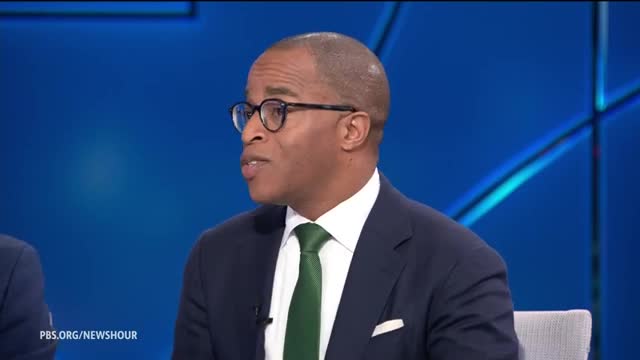Senate leadership shift signals new GOP strategy under Trump
This article was created by AI summarizing key points discussed. AI makes mistakes, so for full details and context, please refer to the video of the full meeting. Please report any errors so we can fix them. Report an error »

In a recent government meeting, discussions centered on significant shifts within the Republican Party and the challenges facing the Democratic Party in the wake of recent elections.
The election of Senator John Thune as Senate Majority Leader marks a notable departure from Mitch McConnell's long-standing leadership. Thune's election reflects a preference among Senate Republicans for a more traditional approach, distancing themselves from the more extreme elements represented by figures like Matt Gaetz, who has been described as \"toxic\" and \"unacceptable\" for leadership roles. Thune's ability to navigate complex political dynamics was highlighted, particularly in his measured response to Donald Trump's potential recess appointments, indicating a desire for a collaborative process rather than unilateral action.
Concerns were also raised about the morale of civil servants in Washington, many of whom are reportedly contemplating their futures amid fears of job security and ideological shifts under a potential Trump presidency. This sentiment underscores a broader anxiety within the federal workforce about the implications of Trump's return to power and the revival of controversial policies.
On the Democratic side, leaders are grappling with a lack of clear direction following disappointing election results. House Minority Leader Hakim Jeffries acknowledged the need for the party to reflect on its strategies and leadership as they prepare for future elections. There is a consensus that Democrats must avoid reactive politics and instead focus on building a cohesive vision that transcends the divisive rhetoric often associated with Trump.
Overall, the meeting highlighted a pivotal moment for both parties as they navigate internal dynamics and prepare for the challenges ahead in a politically charged environment.
The election of Senator John Thune as Senate Majority Leader marks a notable departure from Mitch McConnell's long-standing leadership. Thune's election reflects a preference among Senate Republicans for a more traditional approach, distancing themselves from the more extreme elements represented by figures like Matt Gaetz, who has been described as \"toxic\" and \"unacceptable\" for leadership roles. Thune's ability to navigate complex political dynamics was highlighted, particularly in his measured response to Donald Trump's potential recess appointments, indicating a desire for a collaborative process rather than unilateral action.
Concerns were also raised about the morale of civil servants in Washington, many of whom are reportedly contemplating their futures amid fears of job security and ideological shifts under a potential Trump presidency. This sentiment underscores a broader anxiety within the federal workforce about the implications of Trump's return to power and the revival of controversial policies.
On the Democratic side, leaders are grappling with a lack of clear direction following disappointing election results. House Minority Leader Hakim Jeffries acknowledged the need for the party to reflect on its strategies and leadership as they prepare for future elections. There is a consensus that Democrats must avoid reactive politics and instead focus on building a cohesive vision that transcends the divisive rhetoric often associated with Trump.
Overall, the meeting highlighted a pivotal moment for both parties as they navigate internal dynamics and prepare for the challenges ahead in a politically charged environment.
View the Full Meeting & All Its Details
This article offers just a summary. Unlock complete video, transcripts, and insights as a Founder Member.
✓
Watch full, unedited meeting videos
✓
Search every word spoken in unlimited transcripts
✓
AI summaries & real-time alerts (all government levels)
✓
Permanent access to expanding government content
30-day money-back guarantee
